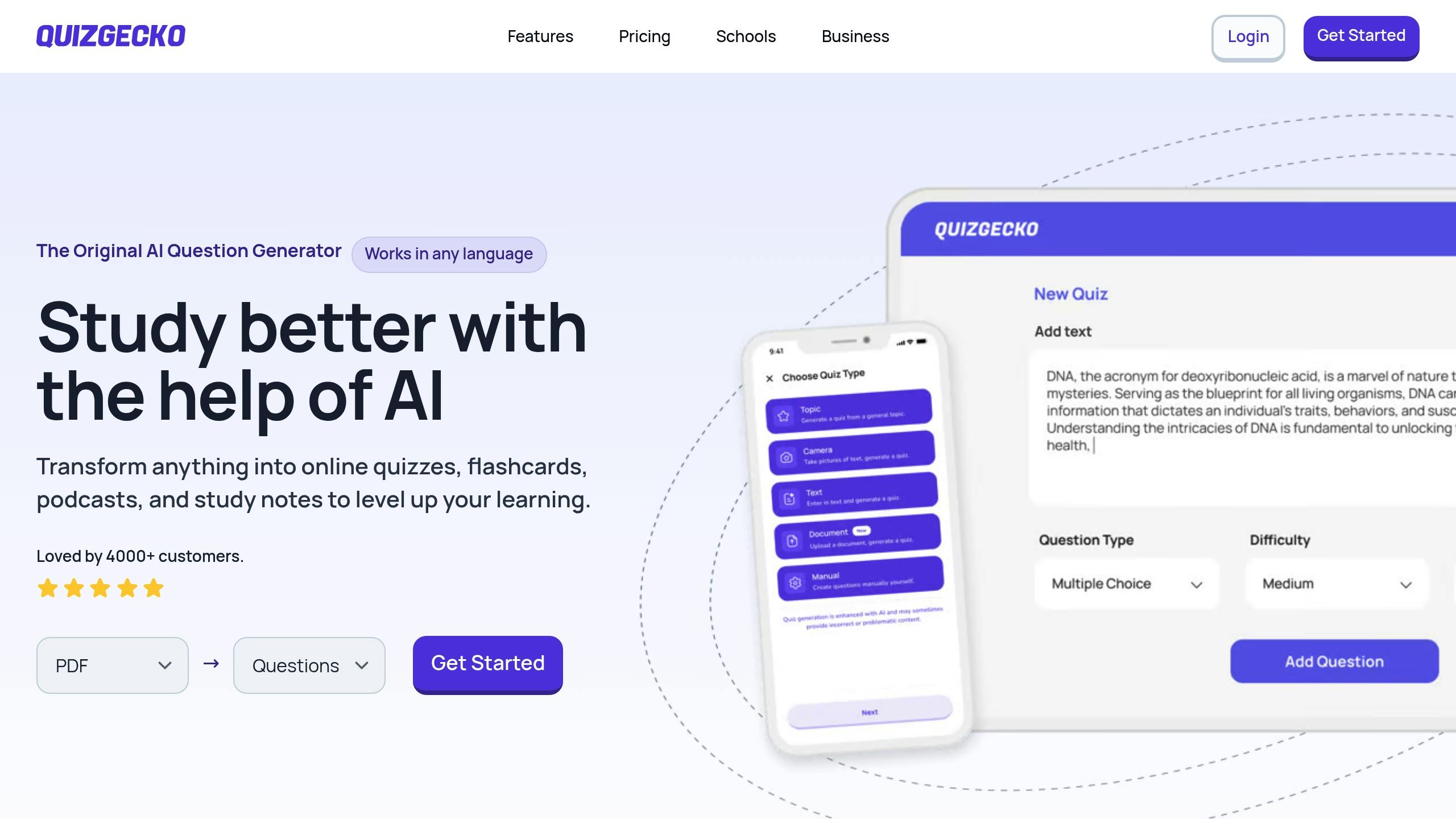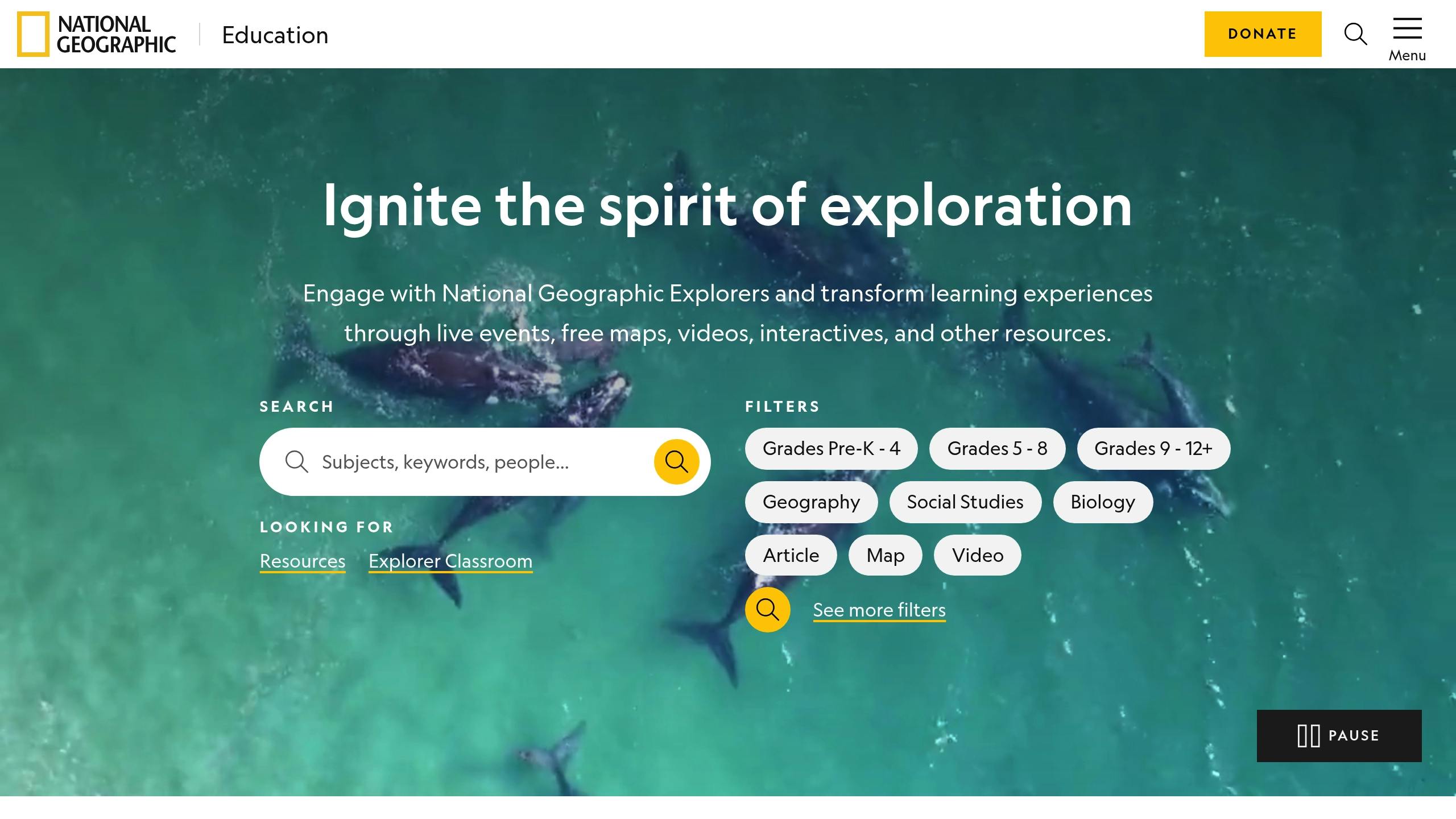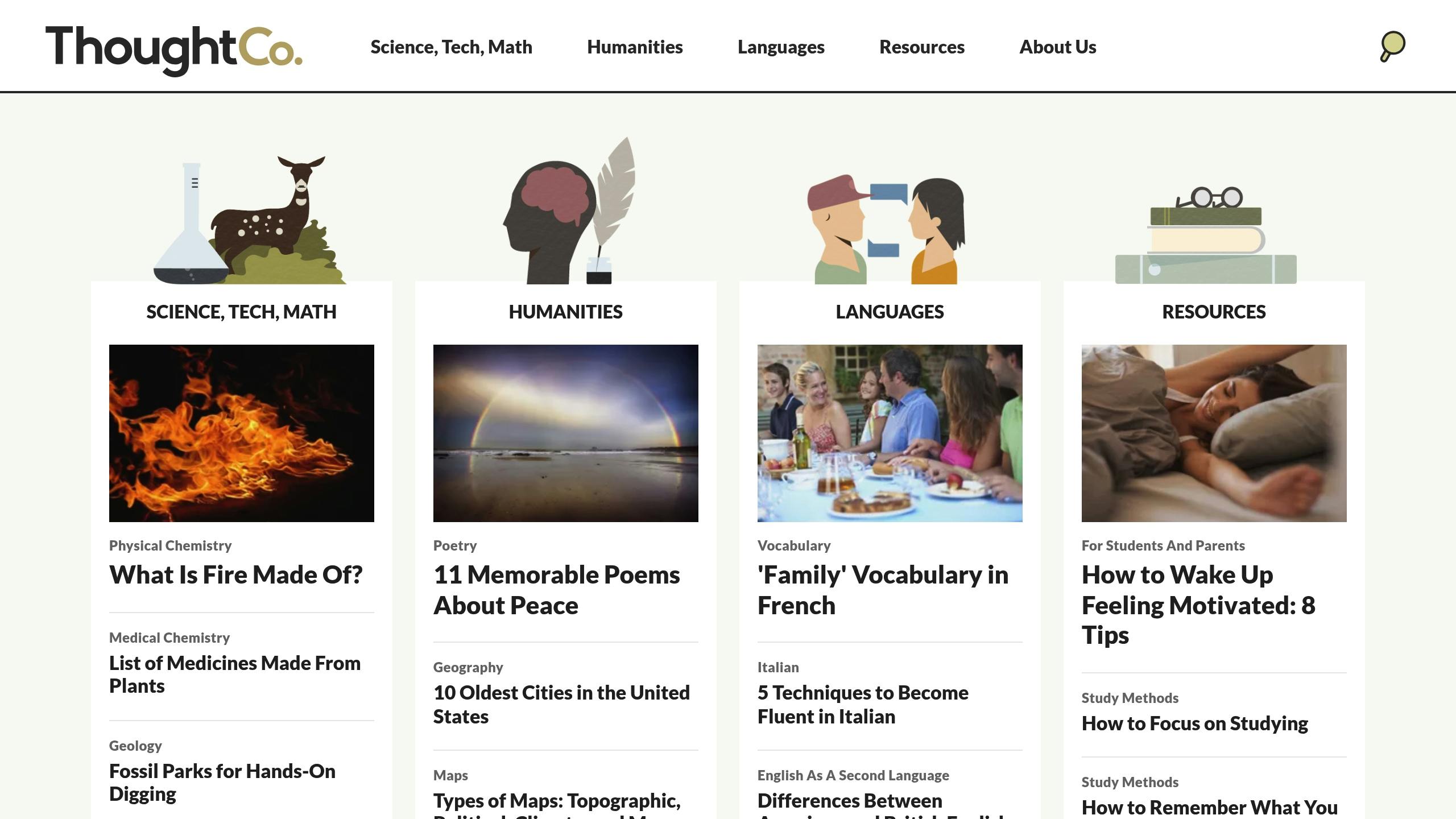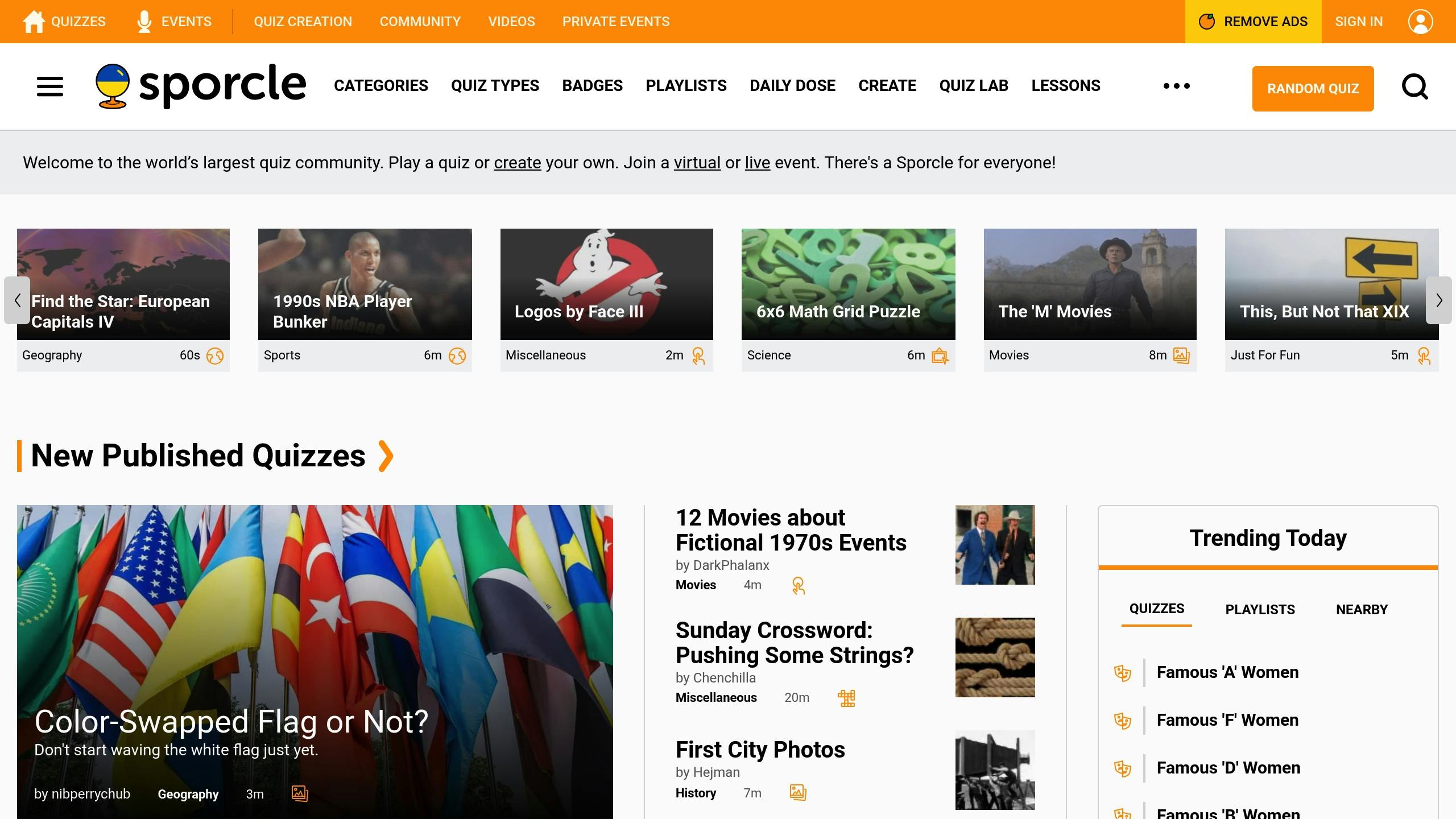Science trivia is a fun way to learn and challenge yourself. It spans topics like biology, physics, chemistry, and astronomy, making it perfect for classrooms, trivia nights, or casual learning. Here’s how to get started:
- Best Resources: Platforms like Cheap Trivia, Parade, QuizGecko, and National Geographic offer curated questions for all ages and expertise levels.
- Formats: Use multiple-choice, open-ended, or interactive formats for variety.
- For Kids: Podcasts like Who Smarted? simplify science for young learners.
- Advanced Options: Tools like QuizGecko generate custom questions from any content.
Quick Tip: Mix easy and hard questions and use visuals to keep participants engaged. Science trivia isn’t just entertaining - it boosts memory, critical thinking, and teamwork skills.
Science Pub Quiz Questions and Answers
1. Cheap Trivia Science Question Sets

Cheap Trivia offers a monthly science trivia subscription for $59.99. Subscribers get over 40 questions every week, divided into four rounds (three Q&A rounds and one picture round), available in both PDF and PowerPoint formats.
In addition to the subscription, they provide themed packs like the "Astronomy Trivia Space Science Night Theme Pack", which breaks down complex topics into more digestible content.
If you're looking for budget-friendly options, platforms like Teachers Pay Teachers have some great alternatives:
| Resource Name | Creator | Price | Features |
|---|---|---|---|
| Science Game Activity: 2 Truths and a Lie | Flying Colors Science | $5.99 | Fun, interactive format with fact-checking activities |
| Halloween Science Trivia Game | Big Red Science | $4.99 | Seasonal themes with no prep required |
| Science Trivia Question of the Day | Current Mood Inspired | $8.00 | 180 daily questions for ongoing engagement |
| FUN Science Trivia Game (V1 & V2) | Science With Cindy | $3.99 each | Offers multiple difficulty levels |
To make the most of these resources, try organizing questions from easier to harder to help participants gradually build their knowledge. Cheap Trivia's subscription ensures a steady stream of fresh, high-quality content, perfect for both virtual and in-person trivia sessions.
2. Parade Science Q&A Collection
Parade's Science Q&A Collection offers a treasure trove of trivia questions spanning various scientific fields, making it perfect for teachers, trivia hosts, and curious minds. The questions are neatly categorized by subject, covering a wide range of topics:
| Scientific Field | Key Topics | Sample Questions |
|---|---|---|
| Earth Science | Geology, Astronomy, Meteorology | How far is the Earth from the Sun? (93M miles) |
| Biology | Human Anatomy, Genetics, Ecosystems | What percentage of the human body is water? (60%) |
| Chemistry | Properties of Matter, Atmospheric Science | What percentage of Earth's atmosphere is nitrogen? (78%) |
| Physics | Motion, Energy, Light | What is the speed of light? (299,792,458 m/s) |
The collection highlights both historic milestones and modern advancements. For example, it includes trivia about Edison's 1877 phonograph and its first recording, Mary Had a Little Lamb .
To deepen understanding, pair these questions with interactive experiments. The material ranges from simple facts to complex concepts, making it easy to tailor for any audience. Educators and organizers can sort questions by difficulty or topic, ensuring they fit everything from relaxed family trivia nights to structured classroom sessions.
For added variety, mix topics to create unique trivia formats or transition into more specialized question sets as needed.
3. QuizGecko Science Topics Database

QuizGecko uses AI to turn scientific content into trivia questions across various fields. It can create trivia sets from sources like text, URLs, PDFs, DOCs, and PPTs.
| Feature | Capability | Application |
|---|---|---|
| Content Sources | Text, URLs, PDFs, DOCs, PPTs | Generate questions from scientific papers and textbooks |
| Question Types | Multiple choice, True/False, Short answer, Matching | Create a variety of quiz formats |
| Difficulty Levels | Adjustable settings | Match questions to different expertise levels |
| Export Options | Text (Aiken), CSV, QTI | Works with various learning platforms |
This tool fits perfectly into trivia sessions, enhancing both learning and engagement.
Users can input scientific articles to create tailored questions on topics like quantum physics or molecular biology. It also tracks participant performance through analytics, making it useful for classrooms and trivia competitions.
"As a classroom teacher, Quizgecko has saved me hours of planning time to create questions from content. The AI question generator gives me numerous options to choose from. Which I then hand select for the most valuable ones that match my curriculum for my students." - Fred Bland, Teacher
QuizGecko can also incorporate visuals like diagrams and charts into its questions. Its topic mode scans web content to generate science questions automatically. For added convenience, the Chrome extension allows users to create trivia directly from web pages. The "Assign" feature helps manage participant interactions with adjustable time limits and due dates, making it a great tool for structured competitions or educational assessments.
4. Who Smarted? Kids' Science Questions
Who Smarted? brings science trivia to life for curious kids through an engaging podcast format. It turns science into fun, adventure-filled stories that kids love.
The platform offers two main ways to explore science trivia:
| Format | Features | Content Type |
|---|---|---|
| Free Podcast | Two episodes per week with trivia games | Fun science adventures and basic questions |
| Who Smarted?+ | Ad-free episodes, an extra weekly episode, and "Trusty Trivia Thursdays" | Exclusive content and bonus materials |
The trivia covers a wide range of topics like astronomy, biology, and chemistry . Each 15-minute episode breaks down complex ideas into easy-to-follow, scripted adventures for kids .
Here are some examples of their science questions:
| Topic | Sample Question | Answer |
|---|---|---|
| Earth Science | How much of Earth is covered in water? | 71% |
| Biology | How many bones are in the human body? | 206 |
| Chemistry | What is the formula for water? | H2O |
| Space Science | What galaxy contains our solar system? | The Milky Way |
| Plant Biology | What process do plants use to make food? | Photosynthesis |
These examples show how Who Smarted? makes everyday science facts exciting and easy to understand for kids.
"We hear from parents and educators every day who tell us that their kids and students are suddenly interested in learning more about the world around them. We CAN say that Who Smarted? is designed by writers, producers, and educators to ignite, amplify, and satisfy your child's natural curiosity." – Who Smarted?
A team of STEM experts ensures the content is both educational and entertaining .
5. National Geographic Science Facts

National Geographic combines in-depth education with stunning visuals, turning complex science topics into engaging trivia.
Using a mix of question formats, National Geographic approaches learning through two main platforms:
| Platform | Content Focus | Target Audience |
|---|---|---|
| National Geographic Main | Topics like advanced science, geography, and space exploration | Adults and science enthusiasts |
| Nat Geo Kids | Simplified science, wildlife, and general topics | Young learners and families |
Their trivia often highlights physical geography and natural phenomena. For instance, the "Extreme Earth Quiz" challenges participants with questions about geographical superlatives, paired with breathtaking photography . This emphasis on visual storytelling makes their quizzes both informative and captivating.
The trivia spans several key areas:
| Science Domain | Example Topics | Question Types |
|---|---|---|
| Earth Science | Volcanoes, oceans, mountains | Physical features and processes |
| Space Science | Solar system, galaxies, cosmic events | Astronomical phenomena |
| Wildlife Biology | Animal behavior, ecosystems, adaptation | Species characteristics |
| Physical Geography | Landforms, climate patterns, natural resources | Global features and locations |
These visually rich question sets encourage fact-based learning, making them a great resource for educators and curious minds alike.
One example from National Geographic Kids states:
"All of the blood in your body travels through your heart once a minute."
Facts like these ignite curiosity and inspire deeper exploration of scientific concepts. The platform's trivia is ideal for educational settings, mixed-age groups, or anyone looking for an interactive way to learn. Each quiz introduces foundational ideas while delving into more advanced topics, appealing to both casual learners and dedicated students.
sbb-itb-46dff1a
6. Science Focus Quiz Library
BBC Science Focus Magazine's Quiz Library is a treasure trove of science trivia crafted with input from top scientists and experts. It provides clear, reliable answers to challenging scientific questions, making it a great resource for both casual learners and serious science fans.
The library breaks down complex topics into easy-to-understand content, maintaining high academic quality. For trivia events, you can use its multimedia elements and form diverse teams to create an engaging and educational experience that draws on the expert knowledge it offers.
This resource is part of BBC Science Focus Magazine's broader educational efforts, which also include the Instant Genius podcast. Together, these tools are perfect for educators, trivia organizers, and anyone looking to expand their science trivia collection.
7. Trivia Plaza Science Topics

Trivia Plaza offers a wide range of quizzes, neatly organized into categories that cover both general topics and more specialized areas. Unique collections like Definitions & Sciences, Scientist Pictures, Fear & Phobias, and Inventions & Inventors add variety to the quiz experience, making it appealing for different interests.
The science section is divided into clear categories such as General Science, Animals, Astronomy, Biology, Elements, and Math & Measurement. This organization makes it simple for trivia fans to dive into their favorite topics.
| Science Category | Highlights |
|---|---|
| General Science | Covers fundamental concepts and theories |
| Animals | Focuses on species, classification, and behaviors |
| Astronomy | Explores the solar system and space-related topics |
| Biology | Includes human anatomy and cellular functions |
| Elements | Features periodic table knowledge and chemical details |
| Math & Measurement | Tests skills in calculations and unit conversions |
For those interested in human biology, subcategories like Human Body Facts and Bones in the Human Body provide detailed and engaging content.
Another standout feature is the platform's rating system for quizzes. This allows users to quickly assess the difficulty of each quiz, which is especially helpful when planning trivia events. By using the ratings, organizers can create balanced question sets that suit a wide range of audiences.
Planning a trivia night? Trivia Plaza's diverse categories make it easy to design an engaging session. You can combine visual challenges like identifying scientists from the Scientist Pictures section with more technical questions from areas like astronomy or biology. Whether your event lasts an hour or three, the platform's variety ensures that everyone stays entertained and challenged.
8. ThoughtCo Science Question Bank

ThoughtCo offers a well-organized science question bank curated by Anne Marie Helmenstine, Ph.D., covering a broad spectrum of scientific topics. It's designed with clear categories, making it easy to navigate through different fields of science.
Here’s a glimpse of the topics included:
| Scientific Field | Key Focus Areas |
|---|---|
| Chemistry | Basics, Chemical Laws, Periodic Table, Biochemistry |
| Biology | Human Anatomy, Cell Functions, Species Classification |
| Physics | Atomic Structure, Forces, Energy |
| Geology | Rock Formation, Earth Sciences, Minerals |
| Astronomy | Solar System, Celestial Bodies, Space Exploration |
What sets this question bank apart is its detailed explanations and a scoring system that ranks participants from "Science Dropout" to "The Next Einstein", adding a fun and competitive edge to trivia sessions.
Sample questions include:
- What is the function of ribosomes in cells?
- Which atomic component orbits the nucleus?
- Mycology is the study of which organisms?
The Chemistry section stands out with its practical subcategories like Projects & Experiments, Chemistry In Everyday Life, and Activities for Kids. This makes it particularly handy for trivia events that aim to link science with everyday life.
The questions cater to varied difficulty levels, from simple queries like "How many legs do spiders have?" to more advanced topics like metamorphic rock formation or complex biochemistry. This flexibility enables organizers to create quizzes with themed rounds and gradually increasing challenges, making it perfect for both casual fun and educational purposes.
9. Sporcle Science Quiz Collection

Sporcle stands out as a go-to platform for science trivia enthusiasts, offering an impressive library of 54,943 science quizzes that have been played more than 161 million times . Covering a range of scientific fields, this platform caters to fans of everything from chemistry to astronomy.
Here’s a look at some of Sporcle's most-played science quizzes:
| Quiz Title | Play Count | Focus Area |
|---|---|---|
| Periodic Table of Elements | 5.4M+ | Chemistry |
| 3 Letter Body Parts | 5.4M+ | Anatomy |
| Digits of Pi | 3.3M+ | Mathematics |
These quizzes highlight the platform's ability to attract and engage a wide audience. Whether you’re into multiple-choice questions, timed challenges, or interactive clickable formats, Sporcle has something for everyone. Topics include Anatomy, Biology, Physics, and more, with many quizzes earning ratings of 4 stars or higher .
Sporcle’s commitment to quality is evident through its dedicated science editor, who ensures the content remains engaging and well-curated . Some standout quiz formats include:
- Science Grab Bag: A mix of questions from physics, chemistry, and astronomy.
- Subcategory Multiple Choice: Science: A test of broad scientific knowledge.
- Everything Sporcle is in Order: Science Edition: Challenges players to sequence scientific concepts correctly.
Beyond individual quizzes, Sporcle fosters group participation with features like Zoom breakout rooms for team activities and has hosted over 130,000 pub quizzes . The platform’s library grows daily, thanks to user-generated content that undergoes community ratings and editorial review to maintain its quality.
10. Mental Floss Science Facts

Mental Floss is known for its fascinating trivia that challenges what we think we know and encourages curiosity. Their science fact collection covers a wide range of topics, from the mysteries of space to the quirks of human biology, making it a go-to for trivia enthusiasts.
They simplify complex scientific ideas into easy-to-understand nuggets of information. Here are a few standout examples:
| Scientific Field | Notable Fact | Additional Context |
|---|---|---|
| Human Evolution | 35% of people are born without wisdom teeth | Researchers suggest that as humans evolve, traits like wisdom teeth, appendixes, and even little toes may disappear |
| Astronomy | The universe's color is "cosmic latte" | This beige hue was identified by Johns Hopkins University scientists after analyzing light from 200,000 galaxies |
| Space Science | The oldest known star is 13.8 billion years old | This star, nicknamed "Methuselah", is nearly as old as the universe itself |
| Neuroscience | 12% of people dream in black and white | A detail that offers insight into how our brains process visual information during sleep |
Beyond these facts, Mental Floss shares surprising tidbits that make trivia even more fun. For example, did you know space has a distinct smell? Astronauts describe it as a mix of diesel fumes, gunpowder, and barbecue - caused by dying stars .
"Hello" wasn’t widely used as a greeting until telephones became popular. Thomas Edison played a key role in promoting its use by convincing phone book printers to include it .
They also highlight quirky revelations, like the fact that some cats can actually be allergic to humans . These insights turn everyday assumptions into memorable trivia moments.
Conclusion
Science trivia can be an effective way to make learning enjoyable and impactful. Research highlights its benefits: students engaged in quiz-based learning were distracted only 19% of the time, compared to 39% for those taking breaks. Plus, these students scored an impressive 84% on tests.
Why does it work? Trivia taps into our natural curiosity, making it easier for the brain to absorb and retain new information. This creates a positive cycle - low-pressure quizzes build confidence, which boosts motivation and keeps engagement levels high.
Here are some ways to use science trivia effectively:
| Setting | How to Use It | What You Gain |
|---|---|---|
| Classrooms | Start with quick quizzes or bell ringers | Better retention and less test anxiety |
| Workplaces | Add trivia breaks (e.g., via Slack) | Stronger team morale and bonding |
| Social Events | Organize themed trivia nights | More interaction and shared learning |
| Remote Teams | Host virtual trivia sessions | Casual connections and team engagement |
For example, remote trivia can keep teams connected by offering a fun, non-work topic to discuss. Joshua, a Data Scientist from New York City, shares: "My team's been using Water Cooler Trivia for more than two years. When we were in the office, it was fun to chat about the results and celebrate the winners. Now that we're remote, it’s great to have something non-work-related to discuss on Slack each week."
Science trivia also improves memory, focus, and cross-disciplinary understanding. Whether you’re an educator looking to make class more engaging, a manager aiming to boost team morale, or someone who simply loves learning, trivia provides a practical and enjoyable tool.
"Trivia is more than just a fun game – it's a powerful tool for mental and social enrichment." – S&S Blog
Start small with weekly trivia sessions and tweak the difficulty as needed. The resources shared here can help you kick off your trivia journey, whether for personal growth or group activities.
